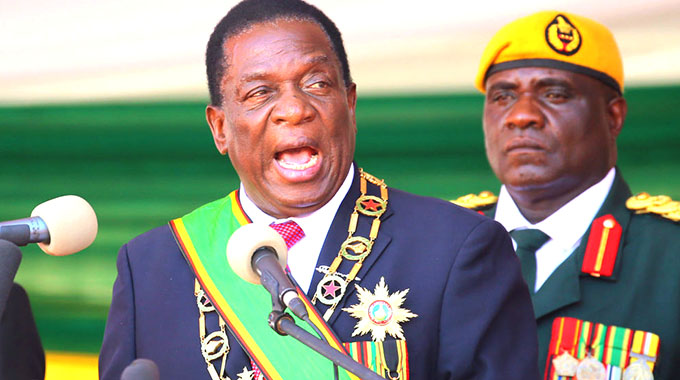President Mnangagwa re-assures Zimbabweans
Share

Harare (New Ziana) – President Emmerson Mnangagwa has said the wholesale economic and political reforms that his government is carrying out are not intended to appease the nations of the world but to fulfill the wishes of the millions who demonstrated in November 2017 demanding a new Zimbabwe.
The peaceful country-wide demonstrations eventually led to the resignation of the late former President Robert Mugabe, ushering in the new dispensation led by President Mnangagwa.
Since then, the government has pursued an economic reform agenda as it lays foundations to achieve an upper middle-income economy by 2030.
At the same time, wide-ranging political reforms are also being pursued.
In an article for CNBC Africa to mark the second anniversary of the marches, President Mnangagwa said although the reform process was tough, the government was committed to fulfilling the wishes of the masses.
“We are not reforming to appease the nations of the world, but because reform is necessary to build the future our people desire. Of course, there is still much work to do, but we are heading in the right direction,” he wrote.
“In November 2017, we also found ourselves mired in an economic mess, a dark and dangerous fiscal tunnel, with no apparent light at the end of it. Today, we have a balanced budget for the first time in living memory, and we have restored our own currency, enabling us to take control of both our fiscal and monetary policy.
“Of course, too many Zimbabweans still suffer, but austerity is a painful but necessary part of the recovery process. Led by our internationally recognised Minister of Finance, Professor Mthuli Ncube, we will continue to restructure, revamp and rebuild our economy. We cannot and will not hold up our hands. We must reform or perish.”
President Mnangagwa added; “We as leaders have a duty to set a new course for our people. A course where not only is our fate in our own hands, but where no one is left behind. A course with a balanced budget, an open political space, and a thriving economy providing the jobs and opportunities our people deserve. I shall never stop working towards these goals and will never waver in my determination to realise the dreams of all those who took to the streets two years ago. I am confident that with patience, perseverance and our unbending commitment to reform, we will get there.”
President Mnangagwa highlighted some of the changes his government has introduced including removing the much maligned Public Order and Security Act which he described as a remnant of the old Zimbabwe.
POSA was replaced with the Maintenance of Peace and Order Bill which was drafted with input from civil society and several other stakeholders.
Part of the legislative reform agenda also includes removing antiquated laws such as the Access to Information and Protection of Privacy Act (AIPPA) and replacing it with three new laws, namely the Freedom of Information Bill, the Protection of Personal Information Bill and the Zimbabwe Media Commission Bill.
“Developed in consultation with a diverse range of stakeholders, these laws meet international media freedom standards and ensure the right to freedom of expression and freedom of media,” he said.
“These have been key demands of the international community, and should be interpreted as a sign of our commitment to reform.”
On top of that, the President said in July last year, Zimbabwe held the freest and fairest elections in the country’s history as all international monitors commended the new and free campaign environment and the vast improvement in the electoral process.
He said he was eager to continue working with the international community to improve and refine Zimbabwe’s democracy.
“I call on the nations of the world to help us speed up this process, to support the people of Zimbabwe as we undertake these painful but necessary reforms. If the goal of sanctions is to stimulate the reform process, their effect is the opposite. They slow down our progress, inhibit our economic recovery and empower those who do not wish to see Zimbabwe change.
Their removal will therefore be an important step on the road to a better future for all the people of this country,” he said.
The Southern African Development Community dedicated 25 October this year as a day when member states held activities denouncing sanctions that some Western countries imposed on Zimbabwe in solidarity with the country.
Zimbabwe estimates that the sanctions have cost it more than $100 billion in lost trade, investment, donor support, loans and lines of credit, prompting the decimation of the local currency and near collapse of the economy.
New Ziana









